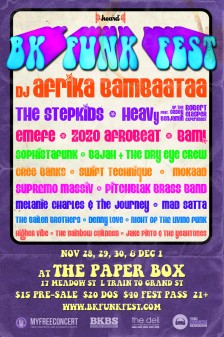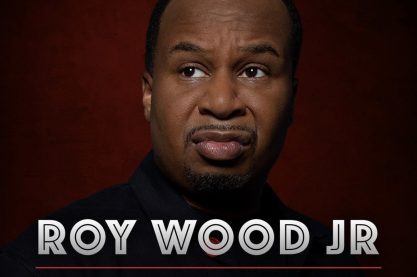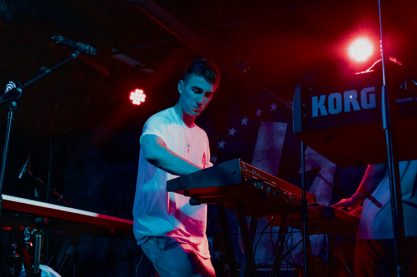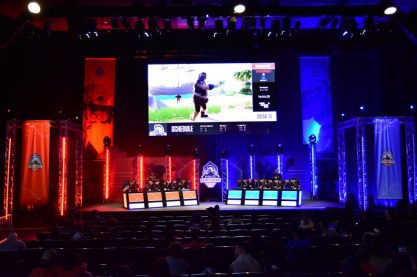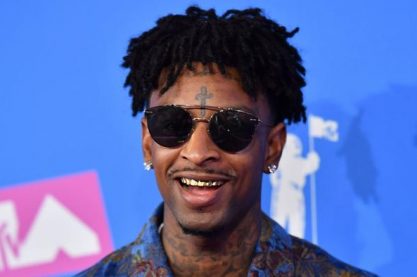Featured
INTERVIEW: Afrika Bambaataa (Part 1)
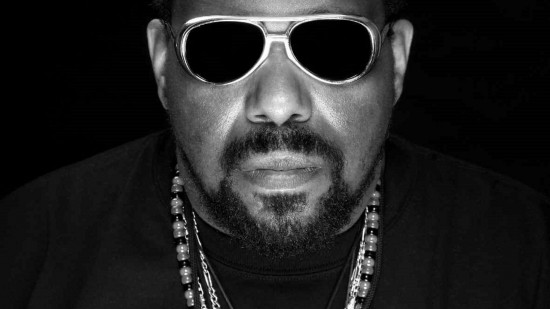
Interview Conducted by The Company Man
Here’s seven of the most important words in Hip Hop history: Afrika Bambaataa and the Universal Zulu Nation. The pioneer and cultural movement, spreading peace, love, unity, and having fun worldwide for 30 years and counting. We’re conditioned to think of Hip Hop as Rap music; as a genre much like any other that exists for our leisure, for entertainment. One that peddles little more than drugs and alcohol. “Oh hell naw,” as Andre 3000 once answered so succinctly. “But yet it’s that, too.” Clarifying the distinction is just an inkling of the impact of Afrika Bambaataa’s career. He’s literally altered the flow of music forever, spawning a slew of new genres, championing knowledge and awareness at every turn. And we’re all better because of him.
In this exclusive interview with The Couch Sessions - ahead of his BK FUNK FEST headlining performance Saturday night - Afrika Bambaataa details Hip Hop’s connection to Electro Funk and others, the initial reactions received when the Universal Zulu Nation introduced the world to Hip Hop culture, music industry consolidation, and how today’s music resembles the sound he created over three decades ago.
CouchSessions: This is usually a question that I end with when I interview artists with perspective. You’re one of the founders of Hip Hop; one of the two major people who are credited most often to igniting this entire culture. With everything that you have seen and have witnessed throughout your career what still surprises you about Hip Hop?
Afrika Bambaataa: What surprises me about Hip Hop is that the culture movement is still reaching major heights in other countries, cities, and towns where people still try to hold onto the real culture movement of Hip Hop. Whereas as in the United States - the foundation from which it comes - you have the people who follow Hip Hop culture the whole movement and then you have the other side that just follows rappers.
CS: Why do you think that’s the case? What influences have happened in your view that have segmented the two? From my point of view, i’d say that you know it seems as the industry as corporate America got hip to how popular Hip Hop, the music itself became the product and most people’s initial interactions were with the music which is now really really far away from the cultural aspect. In your option why are we now at the point where there is two separate views of what Hip Hop is?
Afrika Bambaataa: Well you have media then you have select little secret groups of companies that try to control Hip Hop culture through its rappers. As a corporation, they think they can keep controlling that and make all the money just using the rappers - where that they feel like they don’t have too much power in controlling a graphic artist, B-Boy or B-Girl and they know they can keep certain rappers by they grip. Keep the money sign in their face or a car or whatever. If somebody’s on drugs, they just keep providing them drugs and control they career and tell them what to do or what to sound like. It’s a control thing and its also like a Luciferian Conspiracy going on in the Rap world where they’re trying to hijack the whole culture movement of Hip Hop.
CS: Do you think that the industry treats Hip Hop differently than Rock at this point; or jazz; or other music forms or other culture started by Black people?
Afrika Bambaataa: Oh most definitely. They have caused a split division like almost Apartheid in Hip Hop where you have the True School people that follow the whole culture movement of Hip Hop for what it is. Then you have the people who follow just the what’s the next hit record of a Rap song. Then you got the media payola control on the radio industry - that’s why so many people are getting tired of what they’re hearing on these so called Hip Hop or R&B stations which don’t know nothing about the word Hip Hop. That’s why so many people are stating to turn to satellite stations or internet radio stations because they get tired of what they are hearing on the so called media radio stations - especially ones that claim to be R&B and Hip Hop. Which all they are playing is just Rap songs. If they was a true Hip Hop radio station they would play all the different categories of Hip Hop - the old with the new, the new with the old, 365 days a year and 366 leap year. So they faking the funk on most people who think they are hearing Hip Hop music. And you ask them where is the Hip Hop R&B the Hip Hop Ragga; or the Hip Hop Jazz; the Hip Hop Soca; the Hip Hop or Hip House; the Trip Hop? Where’s your Electrofunk; your Miami Bass; your Go Go? You’re not playing all the different flavors of Hip Hop rap songs. Where’s your break beats? Deejays, where’s James Brown? Where’s all the funk that we used to play and still play at our parties in Hip Hop music? You’re not truly playing Hip Hop.
CS: It sounds like its more conspiratorial the way you describe it. Is that fair to say? And I ask because Lupe Fiasco just did an interview [and said something interesting]. Lupe is often credited as one of these artists who is extremely conscious and extremely unflinching in his beliefs and his art as he wants to present it and has run into numerous conflicts with his record label over his three album career now because of that. The question posed to him was that if the most popular form of Hip Hop was White people calling each other “Cracker” over and over and over again, would the labels still push the music? Lupe said he thinks it would happen because the music itself has become a product. What you are saying sounds like its more directly aimed; more conspiratorial towards disenfranchisement of Rap music from the Hip Hop culture but also as I means to you know to denigrate Black communities.
Afrika Bambaataa: Oh big time! Say the Rock Steady Crew had an anniversary, or the Universal Zulu Nation - the only true Hip Hop anniversary in the world - you would think they would go crazy back us up and say everybody is coming to be part of this like they used to back in the day. But now it’s split. It’s about Alize and sisters sliding up and down the pole and shaking their ass, “don’t stop, get it get it.” Let one rapper get into some problems - go and punch somebody or sock somebody or something - they think it’s the whole Hip Hop culture. They don’t go to all these other events that show the whole cultural movement: Peace, love, and unity where people are just having fun there’s no negativity. People are just enjoying themselves you don’t hear nothing about that on a world basis, but you always hear about the negative something or someone that may not even be Hip Hop - they may sing a song or something like Rihanna and [Chris Brown]. They consider them like two Hip Hop people are fighting and they got nothing to do with it. They’re two R&B singers. They categorize on that; generalize on that to make it look like this is what Hip Hop do. “See, they shoot each other. They wanna beef, beef, beef, and all this.” And they don’t look at all the other spots that deal with culture where you see peace, unity, love and having fun.
It’s a conspiracy. It’s people with money and power that control that and tell you what your song is gonna be and what you should be putting out. If someone is talking using the B-word so much - or the N-word - they just keep pushing that. Even on some of the satellite stations where they say what you want, but they think that it’s so cool that you can just use the N-word so much and the B-word. Everybody is gossiping. They think this is the day of life. This is what it should be. And they’re pushing into the mentality of our youth so they think it’s alright to be a gangster. They think it’s alright that you can get shot nine times and you made it in the industry. So they don’t play the Chuck Ds no more; or the Lupe [Fiascos]; or [Yasiin Bey] and Common Sense and all that. They play that only once here and there, or they might have to sing with someone else before they get a hit record. They’re not putting money behind that, so that’s why a lot of people are starting to follow what Prince did when they stole his name and just put your own thing on YouTube and get out there and promote yourself.
Really, not a lot of people are selling songs. That’s why most of these labels have fallen but they’re all trying to get control of the internet now, because they want to control the whole digital world. Now when people sign you, they’re trying to sign you for the Universe. Somebody came with a contract for me for the Universe, “I said you bring me all the extra terrestrials on each of the planets and show me how they gonna push my music on all these different planets. Otherwise, get that crap out of my eyesight.” Most other people sign It right away because they just want a record deal. So you sell your life away and you children’s children’s children’s children won’t see nothing in life because now they control you for the whole planet. They take control of that and then your family history will never see nothing ever again.
CS: What you’re talking about with N-word and disrespectful names for women is a form of meta-communication is just pervasive all through Hip Hop. Homeboy Sandman recently wrote an interesting article on Hip Hop and meta-communication. He argues how “Where my dawgs at,” for example, is one of those things that is viewed as a term of endearment, but you the dog is looked at “Man’s Best Friend.” So even the word “dawg” itself is less than human. It’s another form of meta-communication that is really popular in Hip Hop.
Afrika Bambaataa: I mean you can use that. That didn’t start with Hip Hop. That was part of the Funk with George Clinton and everything. Uncle George had the “Atomic Dog.” But he also had songs trying to teach you about the Black Hole and stuff like that. They was playing a variety of different things so you had something that was negative, you still had something that was telling you something about love. You still had Aretha talking about “Respect.” How do we go from the Supremes to Sly & The Family Stone to becoming “Bitches With Attitudes” or “Niggas With Attitudes?” We gotta question that stuff. These stakes are really ours. It’s not like in the 1960s when people had the Black stations. You had your Rock stations and they was playing a variety of different sounds consciously? The Curtis Mayfields; the Arethas, the Slys; the James Browns; the George Clintons. You had a variety of stuff. And even in the early stage of Hip Hop, you heard varieties of sounds in Hip Hop music. But, now since they got money, it became like Apartheid - where it’s controlled and what you can say what you don’t say, what you should wear in fashion what you should not wear in fashion.
CS: As part of Zulu nation first performers first acts to bring Hip Hop to Europe. How difficult was that to do? And I not mistaken was that 1983 was that the first time Hip Hop went abroad? Is that true, or am I off on that?
Afrika Bambaataa: You had rappers who had been abroad before that, but on a whole movement culture, we were the first. In 1983-84, we started traveling all over Europe as a whole culture - showing the deejay, the emcee, the Double Dutch, the graffiti all in one spot and also spitting the knowledge. It did a lot of work. Some of the places we hit were major cities and some were [small towns]. We started playing city to city, town to town. I could play one time and be in some cafe. Then I might be in a school. Then I might jump into a big stadium. Then I’m back into smaller places. So that took a lot of work to make that happen. And then speaking to the people and going down to the communities lead rappers coming. Everyone was trying rap in English. I was like, “No, Rap in your own native tongue. Speak about your issues. Or if you wanna talk about partying or women, speak in your own native tongue.” Now you’ve got stars in each respective country - towns and cities all over the Earth - now because they started speaking they’re own native tongues.
CS: What was the response like on the ground? If this was the first time a lot of these people were actually seeing the original five elements in the culture in their countries, what was the feedback that you received? Were they open to it immediately? Was there any cynicism or skepticism?
Afrika Bambaataa: Well in France, some of them was bugging like, “What is that noise that they’re doing on the turntables?” Or when they saw the Double Dutch girls with jump rope, they caught the excitement. They tried to get the feeling and the Funk. In [Italy] you couldn’t bring people up on stage. When most stars go to Italy, they just do their show. The people clap and then you leave. I was the wild one that started going in the audience grabbing the people, bringing them on stage, bringing the girls on stage and make them shake their butt. I used to draw up the Funk sign. Over there it means you F’d somebody’s mother, so like they were like, “F you back!” [Laughs] We had to teach them, “No, this is the Funk!” When they saw George Clinton on TV and seen the dancers get live, that made them start getting excited and they start getting into it.
In Japan, people used to sit down. You do your show. You sing your song and they you don’t feel the vibe. They just clap and then they wait for the next song. So we had to start jumping in the audience, grabbing them, leading them on stage, and start dancing and all that. So we broke the barrier where Funk was like a newborn and everything had to be on the stage. You do your thing and then you got off the stage and people just clapped and leave. They don’t get funky and get down have a good time. So it took a lot of work to teach that peace, unity, love, and have some fun in country to country, city to city, town to town.
CS: Is that when you first received the nickname the “Ambassador?” Is that how it came about after that trip?
Afrika Bambaataa: People just give me all type of names. I just take it all in stride - [remain] humble, just do the work and keep the blessings of the creator that made this happen. I was on my mission to make this happen on a worldwide level.
Look out for Part 2 of The Couch Sessions' interview with Afrika Bambaataa. You can see him live tonight at the BK Funk Fest starting at 7PM at Paperbox NYC (17 Meadow St., L to Grand St.)
